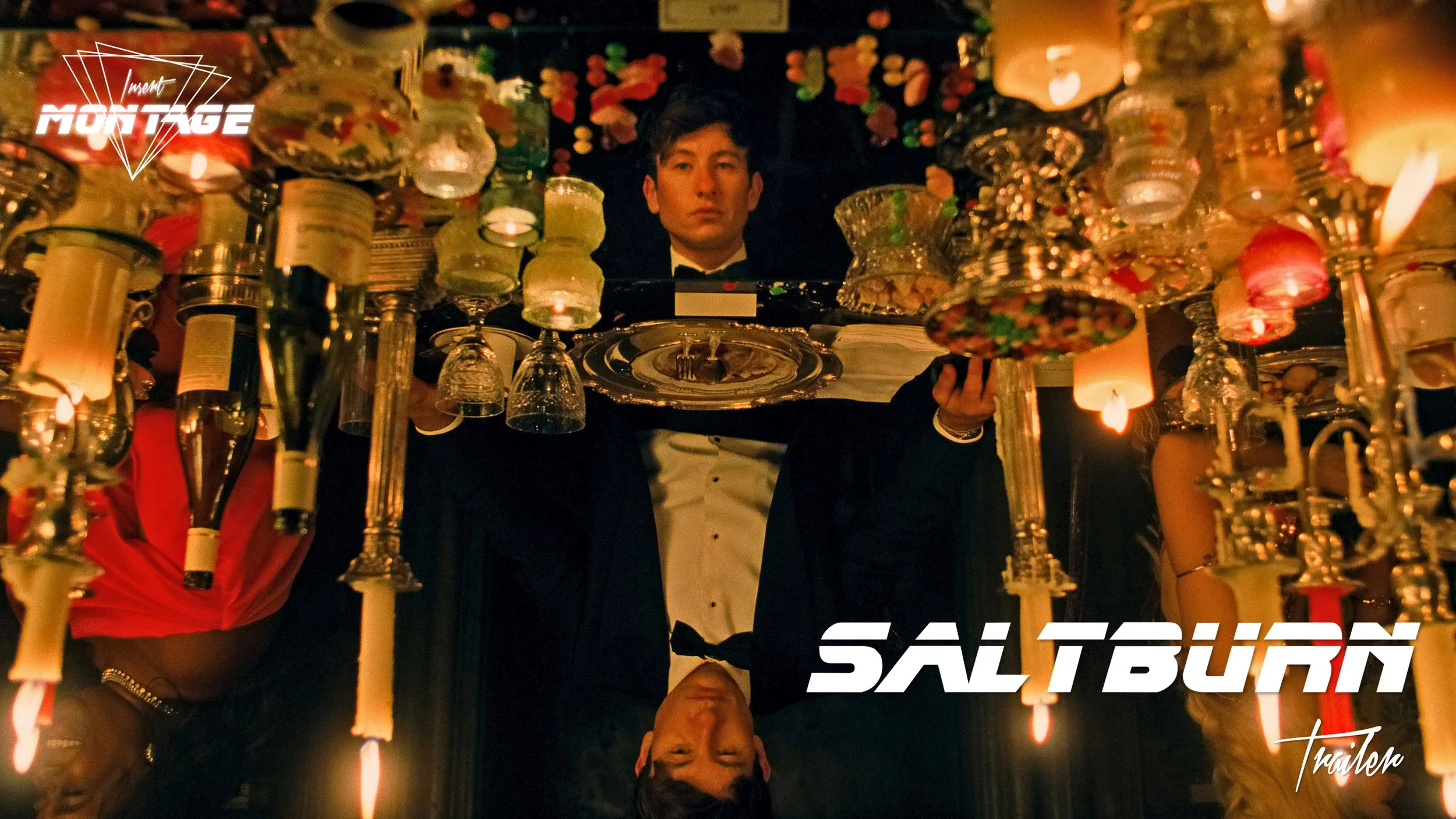SALTBURN
Chaotic, charismatic, horny as hell.
If the aim of any directorial debut is to lay down a filmmaking calling card for the world to see, Promising Young Woman must be considered a success. With style, swagger, and righteous ire to spare, Emerald Fennell’s first feature as director saw her not only slam her card down on the table but proceed to douse it in petrol before setting it ablaze.
It had its issues, for sure, but there’s little doubt that Promising Young Woman’s hyper-stylish brand of bullish, confrontational revenge cinema turned heads, making Emerald Fennell one of Hollywood’s hottest prospects overnight.
However, as with any hit debut, the key question is - how exactly do you follow that success up? Many filmmakers have tried and failed to recapture that initial burst of inspiration, yet, while Saltburn certainly lacks Promising Young Woman’s surprise factor, it packs just as much punch.
Struggling to find his place at Oxford University, student Oliver Quick (Barry Keoghan) finds himself drawn into the orbit of unnervingly charming aristocrat Felix Catton (Jacob Elordi), who invites him to Saltburn, his eccentric family’s sprawling estate, for a summer never to be forgotten.
If there were any lingering fears going into Saltburn that Emerald Fennell had decided to play it safe in the years since Promising Young Woman, they can be well and truly put to bed. Make no mistake, Saltburn is a lot of things – perhaps even too many at times – but safe is not one of them.
With style and mood for days, Saltburn is every inch the wild ride Fennell’s track record and the film’s marketing material suggests, and while some of its uber-stylish aesthetics feel overtly surface-level at times, it’s hard not to give in to its lurid, alluring charms. Much like Barry Keoghan’s Oliver, Saltburn is a shifty, showy, intensely beguiling beast, and it’s all the better for it.
It’s wild, it’s chaotic, it’s horny as hell. Emerald Fennell’s sophomore effort may lack the surprise factor and the bite of its predecessor, yet that doesn’t make it any less impactful. With an anarchic energy every bit as riotous as Promising Young Woman, the film burns with a spiky, off-the-wall playfulness that grins with maniacal glee as it chews you up and spits you out.
Clearly not short on filmmaking confidence, Fennell appears emboldened by her debut’s success, instilling her film with a swagger that’s as striking as it is sensual. Boldly building on what went before, Saltburn is a glossy, visually spectacular piece that, while overtly shallow, marks Saltburn out as one of the most engrossing films of the year.
With a gleefully flirtatious first act, Saltburn certainly takes its time getting going, offering us tempting glimpses at what’s to come as Oliver’s lower class, outsider status is established and his off-kilter relationship with Jacob Elordi’s Felix is formed. However, as slow-burn as this opening act is, once the film’s handbrake is off, boy do things start rolling.
Once the grandiose doors of Saltburn itself are flung open, all bets are off, as Fennell rapidly ramps up the anarchy, action, shocks, and style in a second act of sheer indulgence. It’s also at this point that our two stars, Barry Keoghan and Jacob Elordi, are supplemented by Saltburn’s wider cast, a move that lights a fire under the plot and elevates it all to another level entirely.
On their own, Keoghan and Elordi are a winning duo, possessing undeniable, irresistible, irrepressible chemistry that brings what could be a tired The Talented Mr Ripley rehash to life, however, with the introduction of the wider Catton family, things take a very different turn. Whether it’s the barbed, unblinking wit of Rosamund Pike as matriarch Elspeth, the gleefully grandiose verbosity of Richard E. Grant, or Alison Oliver’s unhinged turn as Felix’s sister Venetia, the ride the Catton family take us on within Saltburn’s wild walls is truly something to behold.
Hell, throw in Archie Madekwe and Carey Mulligan as unhinged fellow Saltburn residents and you have a recipe for deliciously debauched disaster on your hands. Heightened caricatures though they may be, every one of the extended Catton clan are a blend of vampiric aristocratic arrogance and self-entitled silliness with, like much of the film itself, all the emotional depth of a paddling pool.
As the family unravel and the walls of Saltburn begin to crumble, this ensemble, led by a sparkling Jacob Elordi performance that will no doubt shoot his name into the stratosphere, truly make the film what it is, layering on an outrageous, unaware upper crust haughtiness that’s ripe for the picking. And pick Barry Keoghan’s Oliver most certainly does.
As the fulcrum of the crumbling courtly chaos, Oliver shows himself to be a master manipulator, effortlessly wrapping Felix and his family of foppish dimwits around his finger, with Keoghan once again showcasing his incredible chameleon-like abilities in a performance that positively drips with guile, charisma, and no little menace.
Immaculately creepy in a way only he can be, Keoghan is pivotal to Saltburn’s success, darkening the tone, distorting the mood, and deepening the intensity whenever on screen. It’s a truly masterful performance that lends the film real bite, and despite his character, like the rest of the story, fading somewhat as we head into the finale, he keeps both us and the Cattons locked in his clutches throughout.
Unfortunately, just as it looks to be nailing the landing, it’s this third act wobble that ends up knocking Saltburn off course. As the debauched shenanigans come to a head, and we journey into a The Fall of the House of Usher-like conclusion, the dip in energy is noticeable, and while there are certainly some good ideas going on, this finale is, as with Promising Young Woman, where Emerald Fennell finds herself struggling.
As the plot begins to lose momentum, and Fennell’s overt desire to overegg Saltburn’s edginess pudding comes to the fore, the film struggles to keep pace with its stellar initial energy. The result is a Scooby Doo-esque murder mystery wrap up that feels a tad out of step with what came before it, struggling to land the points about class and society it has spent the first two acts setting up.
Despite these backend issues, Saltburn delivers the goods where it matters, offering a riotous, multi-sensory experience that, when at top speed, feels unstoppable. Landing somewhere between Brideshead Revisited, The Talented Mr Ripley, and The Fall of the House of Usher, Emerald Fennell’s film is a stylish, highly chaotic cocktail of genres that’s as shocking as it is enticing.
With style and mood for days, and led by an immaculately creepy Barry Keoghan, Saltburn is a turbulent, tumultuous treat that’s wild, chaotic, and horny as hell. With some finale wobbles, the energy dip in the film’s third act is hard to avoid, however, boosted by a barnstorming cast and some impressively ballsy direction, Saltburn marks an excellent second effort from Emerald Fennell and a very promising indicator as to where things go from here.




